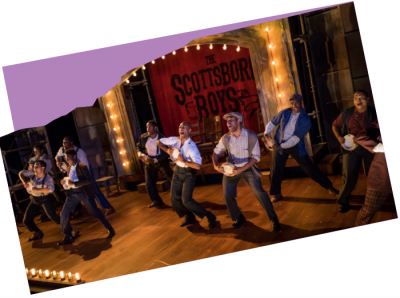Your donation sets the stage for a new season of Boston's most intimate, entertaining and provocative plays and musicals. Our shows make powerful connections with our audiences-- and they are only possible because of you.
The Anatomy of The Whale
The Anatomy of The Whale
Anatomy of THE WHALE
 THE WHALE is full of striking elements: its colorful characters, its setting in small-town Idaho, and of course, its six-hundred pound protagonist Charlie. But playwright Samuel D. Hunter didn’t find his initial inspiration in any of those things. Instead, it was a job teaching expository writing at Rutgers that sparked what is currently the playwright’s most-produced play. SpeakEasy Artistic Associate Walt McGough spoke to Mr. Hunter while the writer was on a brief break at his home in New York City. He had just flown in from opening a new play in Seattle the night before, and was about to head to Washington, DC to continue work on another commission. During the conversation, Mr. Hunter spoke of the genesis of his play, the implications of fat suits, and the parallels between religion and art.
THE WHALE is full of striking elements: its colorful characters, its setting in small-town Idaho, and of course, its six-hundred pound protagonist Charlie. But playwright Samuel D. Hunter didn’t find his initial inspiration in any of those things. Instead, it was a job teaching expository writing at Rutgers that sparked what is currently the playwright’s most-produced play. SpeakEasy Artistic Associate Walt McGough spoke to Mr. Hunter while the writer was on a brief break at his home in New York City. He had just flown in from opening a new play in Seattle the night before, and was about to head to Washington, DC to continue work on another commission. During the conversation, Mr. Hunter spoke of the genesis of his play, the implications of fat suits, and the parallels between religion and art.
A lot of people assume that the idea for The Whale started with the concept of obesity. Is that accurate?
Not really. I had the idea that it would be interesting to write the story of somebody who’s gotten to that size, but I kept myself from writing it because if I were to just start from that place, then it’d be, at best, a topical study, and at worst, a freak show. I didn’t want it to be either of those things, and so I waited until the greater idea fell into place. The play is not about obesity, in any way; Charlie could be killing himself with alcohol the same way that he’s killing himself with food. Obviously that would be a different story, but with similar mechanisms. So, as much as I was interested in a 600-pound character, I did have to wait for that better idea.
And when did that better idea come?
It wasn’t until I was teaching expository writing, and I found myself just trying to desperately connect with these reticent 17- and 18-year-olds who hated me and hated being there and hated the idea of writing, that the distance between those two ideas became very interesting to me. I felt like such a monster in front of them. It was this course required by the state, and it was really just like a cattle call, with so many adjuncts. Also, it was the height of the recession, and I didn’t have any money, and was teaching in the same program with my husband, John Baker. I had been teaching theatre classes at Fordham, but lost those for a bit, and wound up in this program. And it was just that struggle to connect with these kids that really gave birth to the play.
Did you feel pressured/tempted to make it more about obesity as you developed it?
I wrote it quickly enough that I didn’t allow much to get in my way, so I had a full draft by the time there could be anybody pushing me in any one direction. The play, to me and to everybody else, was so clearly not a topical play about obesity. And it’s been interesting seeing the life of the play; I never expected it to have the life that it’s having.It’s been really interesting to see people approach it who know absolutely nothing about it, and seeing them both come to the play expecting it to enlighten them about the experience of weighing 600 pounds, and then having the play be about something different. The play deliberately toys with those expectations, because at the beginning I want to keep people at a distance; I want people to bring in their judgments at the beginning and really keep Charlie at arm’s length. But hopefully the journey is more profound if somebody goes from that place of keeping him at arm’s length or maybe even being disgusted by Charlie, to then at the end truly having sympathy for him.
Do you think seeing an actor in a fat suit is part of that distancing effect?
No more than any other theatricality. With a play like this, nobody thinks that it’s real. Everybody agrees, when the lights come up, that it’s a fat suit. We make that contract with the play that we’re gonna get over it. Everybody was very nervous at the first production in Denver, saying, “Oh my God it’s a fat suit. Are people going to get caught up in it, blah blah blah?” But we found that the moment the actor put it on, it was an artifice like every other artifice in the theatre, like the fact that people all face one direction, and the fact that there’s a missing wall. It’s part of the world, just like any other fully realized theatrical element.
Religion seems to play a large part in your work; not just in The Whale but in your other plays as well. Do you see that as a constant in your writing?
It constantly shows up; and then the moment I think I’m done with it, it just comes right back. For a while I was like, “Ugh, am I a one-trick pony?” But I find now, in January 2014 (and maybe in a year I’ll give you a completely different answer), it’s because religion was a big part of my evolution growing up, my intellectual evolution. I was dealing with a lot of cognitive dissonance between how my critical mind was developing and things I was learning in a Christian school. So that influenced me a lot, and it was also a big part of Idaho for me. I think the more meaningful part of it, though, is that I think religion and art are nearly the same thing. The only real difference is that religion is about the internal, and feeding the internal, which manifests in works, and playmaking is feeding the internal the same way, but it manifests in playmaking. Theatre feels just like church to me. The experience of going to a play and the experience of being in church just feel very similar; and so I think that’s why religion just flows in and out of the plays. We all buy into something, and have faith in something. When we go to a play, we have faith in the actor, and the fat suit, and the artifice. In the same way, we have that faith when we go to a church service. ν – Walt McGough
 Past Productions
Past Productions The Antiquities
The Antiquities Swept Away
Swept Away




